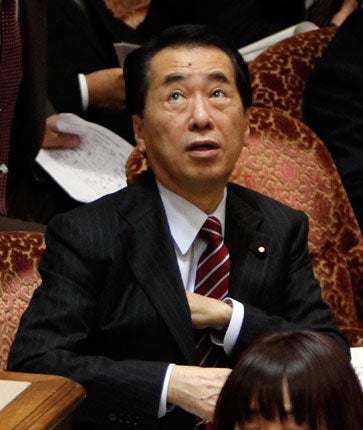Kan's resignation to bring Japan its sixth PM in five years

Your support helps us to tell the story
From reproductive rights to climate change to Big Tech, The Independent is on the ground when the story is developing. Whether it's investigating the financials of Elon Musk's pro-Trump PAC or producing our latest documentary, 'The A Word', which shines a light on the American women fighting for reproductive rights, we know how important it is to parse out the facts from the messaging.
At such a critical moment in US history, we need reporters on the ground. Your donation allows us to keep sending journalists to speak to both sides of the story.
The Independent is trusted by Americans across the entire political spectrum. And unlike many other quality news outlets, we choose not to lock Americans out of our reporting and analysis with paywalls. We believe quality journalism should be available to everyone, paid for by those who can afford it.
Your support makes all the difference.Japan's Prime Minister Naoto Kan has told his cabinet he will step down and dissolve his government next week, signalling another turn of the country's political merry-go-round. Analysts say Japan will have a new leader by next Tuesday.
Mr Kan has tied his resignation to the passage of key legislation that would compel the nation's utilities to buy renewable energies, including solar and wind power.
Japan's lower house cleared the two bills yesterday and the upper house is expected to pass them on Friday, officially kick-starting the leadership race.
Mr Kan's premiership has in effect been over since June, when he survived a no-confidence motion in his government only by promising to quit. In the summer he became the first Japanese prime minister in five years to last more than 12 months.
Candidates among the ruling Democrats (DPJ) have already begun jockeying for the party leadership, which will also fall vacant when Mr Kan quits. The front-runner is the popular former foreign minister Seiji Maehara, who announced yesterday that he will run.
Mr Kan has been accused of fumbling his government's response to Japan's worst natural crisis since the Second World War, sparked by the 11 March earthquake and tsunami. The crisis has been exacerbated by the nearly six-month battle to bring the leaking nuclear power plant in Fukushima under control. Polls put his support rate at below the critical 20 per cent mark.
The Prime Minister stunned his party last month when he pledged a nuclear-free future for the country, a position that immediately put him at odds with party conservatives and the nation's powerful business lobby. Mr Kan later said he was expressing a personal opinion, not party policy.
His successor, the nation's sixth prime minister in four years, will have to deal with a formidable list of problems, including the rising yen, which has surged to record highs against the dollar and hurt the profitability of Japan's export giants.
Tens of thousands of people are still homeless from the March disaster and 80,000 people have been evacuated to temporary shelters from around the Fukushima plant.
The left-of-centre DPJ ended over half a century of almost continuous conservative rule two years ago, promising radical political change. But many voters have been disappointed by its back-peddling on key pledges, including a major shift in spending on education, health and welfare. The party has threatened to disintegrate under Mr Kan's rule
Last night Mr Maehara told his supporters he wanted to "spearhead" the nation's recovery, according to the public broadcaster NHK.
"We must regain public trust in politics, and achieve policies that can help people's sense of safety and hope for the future," he said.
Several prominent DPJ members were quoted in the Japanese media as saying that the country would have a new prime minister by 30 August.
Join our commenting forum
Join thought-provoking conversations, follow other Independent readers and see their replies
Comments